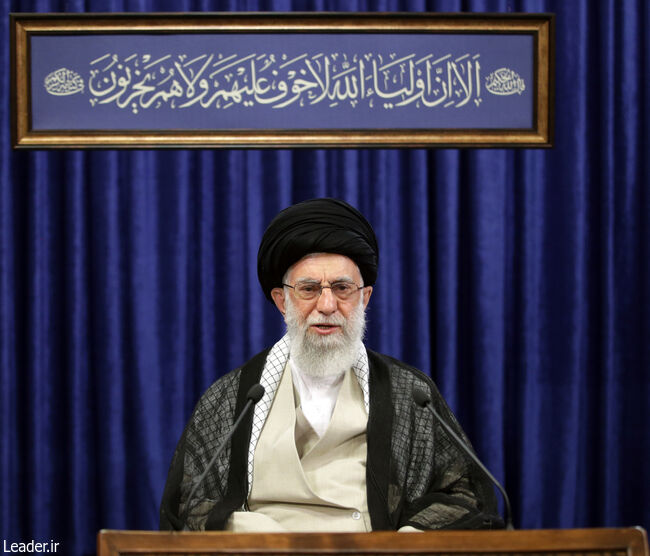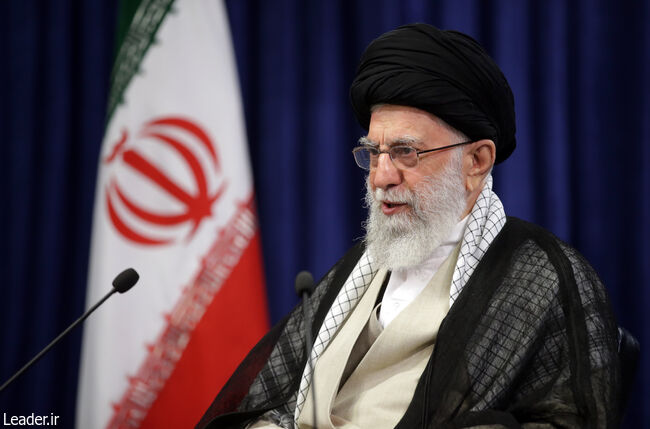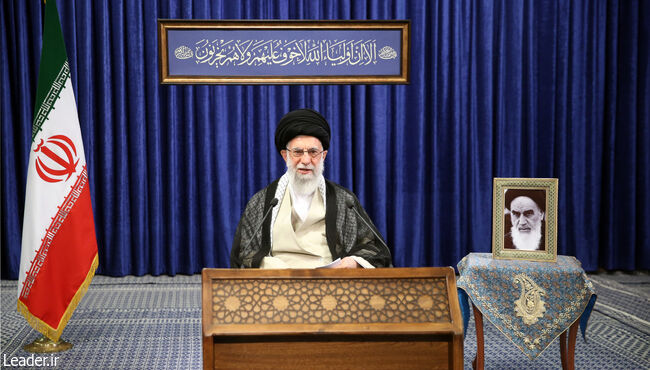In the Name of Allah, the All-Beneficent, the All-Merciful
On the anniversary of Imam Khomeini's passing away, The Supreme Leader of the Islamic Revolution in a televised speech stated:
The way to compensate for the management of inefficiencies and weaknesses is to make the right choice, therefore, not to avoid voting in elections.
On Friday 4th of June 2021, on the anniversary of Imam Khomeini's passing away, Ayatollah Khamenei called the innovation and realization of the theory of the Islamic Republic. Namely, forming a government based on pure Islam and democracy is the most important initiative of the late Imam. He emphasized: Despite all the predictions of the enemies about the decline of the system, The secret of the permanence of the Islamic Republic and Imam Khomeini's system is the combination of the two words "Islamic" and "republic", meaning the simultaneous rule of Islam with the public support. These two words will guarantee continuous progress.
By referring to Imam Khomeini's constant emphasis on the need for the people to participate in elections, the Supreme Leader of the Revolution has called that electing a suitable person is the only solution to mismanagements and problems. He expressed some critical points about the need for the next elected president to adhere to social justice, fight corruption and strengthen domestic production. He added: "People should consider themselves obliged to participate in elections and encourage others to do so."
The Supreme Leader of the Revolution, referring to the re-emergence of the memory of Imam Khomeini during these days of his death, has added: The nation requires guarding the memory and guidance of "that great personality, that irreplaceable leader and that wise and steely will and "Deep faith".
The Supreme Leader of the Revolution, referring to the beginning of the revolution and the unprecedented volume of repeated failed predictions of the arrogant powers about the destruction of the Islamic Republic in two months, six months, or a maximum of one year, added: The Imam's firmness and determination and constant victories in War disappointed them. Since the death of Imam Khomeini, the enemies and ill-wishers have reiterated their desire for the demise of the Islamic Republic.
Ayatollah Khamenei has made some examples of their failed predictions such as the announcement of a worn-out and ambitious party in 1990, a letter issued by a group of parliamentarians, stating that the term of the Islamic Republic was coming to an end and the public announcement by some American officials that the Islamic Republic would not reach 40 years etc. Moreover, he said: These individuals and groups, in their predictions, in addition to expressing their wishes, also referred to the defeat and destruction of the world revolutions.
The Supreme Leader of the Revolution added: "Even inside the country, the two movements: constitutional movement and the national movement have failed right after their formation because of the brutal dictatorship of Reza Khan's completely dark dictatorship; therefore, they rely on the predictions about the destruction of the Islamic Republic.
Ayatollah Khamenei, referring to the complete failure of the predictions of the enemies and the empowerment and continuous development of the Islamic Republic, said: "The glorious and honourable secret of the permanence of Imam Khomeini's system is the combination of the two words; republic and Islamic."
He called the invention of the theory of the Islamic Republic a great work of Imam Khomeini. He added: The great Imam introduced this theory in international political theories and objectified and realized it with the people's power and profound knowledge.
The Supreme Leader of the Revolution considered Imam Khomeini's comprehensive knowledge and mastery of Islamic teachings as the basis for the creation and realization of the theory of the Islamic Republic and said: Imam Khomeini had acquired the necessity of Islamic rule and belief in the people from the heart of pure Islam and believed in them sincerely.
Referring to the staunch opponents of the Islamic Republic and the widespread nature of the Islamic Republic, he added: "Part of the opponents of Islamic rule is 'secular secularists' and believe that religion has no prestige in forming a political system and governing the country and is confined to individual issues and worship. Secularists also thought that religion was fundamentally harmful and opium to society.
The Supreme Leader added: "Another group of opponents of Islamic rule believe in religion but say that Islam should not be tainted with politics. These people are in fact 'religious secularists' and do not believe in the interference and rule of religion in socio-political life."
Ayatollah Khamenei also considered the opposition to the people of the Islamic Republic as two groups and said: Some of these opponents are 'secular liberals' who say that liberals and technocrats should create democracy, and this issue has nothing to do with religion.
He pointed out that the second group of opponents of religious democracy believe in religion, but say that the people have nothing to do with religious rule and that religion should form a government without the reliance of the people, a form of extremism that has emerged in recent years in the formation of ISIS.
Ayatollah Khamenei called religion a rule by relying on the people wisely and not an emotional inference and theory. He continued: Religious democracy has arisen from the text of Islam, and whoever denies it has not studied and pondered in the Qur'an
Summarizing this Part of his speech, the Supreme Leader of the Revolution emphasized: According to the verses of the Holy Quran and the traditions of the Prophet, "if someone believes in Islam, must believe in the rule of Islam as well".
After explaining the issue of Islamic rule, the Supreme Leader of the Revolution addressed the issue of democracy, and emphasizing that the validity of the people's vote is a fundamental issue, said: This issue can be viewed from two perspectives:
1-From a religious and doctrinal perspective and within the framework of rights and responsibilities.
2- From the perspective of the fact that the rule of religion cannot be practised without public (endorsement).
Regarding the people's vote from a religious point of view, he added: "In the verses of Quran and many hadiths, people and elites are considered as responsible for the fate of society as well as preventing the society from deviation and divisions. Enjoining good deeds is also viewed as a public duty, and the establishment of a religious government is one of the essential good deeds. Human beings also have the willpower and the right to determine their destiny; therefore, public involvement in a government is one of the manifestations of the right to self-determination.
The Supreme Leader of the Revolution also referred to the issue of religious democracy in terms of the need of governments for popular support and said: Governments without popular public support will have no choice but to resort to force and oppression, since oppression is not allowed in Islam, the Islamic government is possible only with the public support.
Ayatollah Khamenei emphasized: "The religious democracy and the Islamic Republic is a pure religious plan, it means that if someone says that Imam Khomeini has taken the concept of democracy from the West is baseless. Because the Imam was not a person, who had to give up God's rule for the sake of anything else."
He added: "On the day when the Imam raised the issue of the obligation of hijab in society, some people, including some of the Imam's closed ones, were opposed it, but he categorically implemented the religious rules.
The Supreme Leader of the Islamic Revolution emphasized: The great Imam, by carrying out this religious innovation based on profound spiritual knowledge, brought the Iranian nation, which had been accustomed to tyranny for centuries, to believe in its abilities and do great things such as overthrowing the millennial monarchy. And stand up against the imposed War for eight years where all the world's great powers supported the enemy.
Emphasizing that the Imam considered the two words "republic" and "Islamic", meaning "Islamic sovereignty" and "people's sovereignty" to be the solution to all problems, he added: "Whenever the people were involved, and the Islamic rules were observed, we have significant progress, and whenever any one of the two was not observed, we did not have gain.
The Supreme Leader of the Revolution pointed to an example and said: "If we had facilitated for the growth of small and medium-sized factories by involving public into the field of production, the economic situation would have been in a better position now."
He added: "Therefore, if the officials observe the Islamic limits and standards in domestic and foreign affairs, and provide the mechanism for the presence of the people on the scene, the problems will be solved."
Ayatollah Khamenei, referring to some of Imam Khomeini's statements about Islam and democracy, added: "From Imam Khomeini's point of view, Islam is on the one hand" anti-petrification, anti-eclecticism "," anti-oppression, arrogance, corruption and greed, "anti-American domination and foreign intervention", "anti-aristocracy and class divisions", and on the other hand Islam is "pro-deprived and justice-seeking people".
He also commented on the Imam's views on democracy and elections: The Imam considered the elections as a "religious duty", and in his will, he said that "not attending the elections at some point maybe a major sin" and "failure to participate, may drive to the consequences even to the next generations, which brings divine accountability."
The Supreme Leader of the Islamic Revolution said: "Thanks to God, even after the death of the Imam, the people of Iran have maintained the divine gift of religious democracy and have stood firm against the enemies' conspiracy to separate the people from the system and make them disbelieve in Islam and religious democracy."
Ayatollah Khamenei added: "Unfortunately, some people repeat the words of the enemies in different ways." Sometimes they talk about the need to de-ideologize and move towards liberal democracy. Sometimes they come from a position of compassion for the sanctity of religion, and some even say that Islamic rules cannot be combined with democracy.
He emphasized: "Those who repeat these words are not sympathetic to the Iranian nation and are trying to cut the roots of Islam."
The Supreme Leader of the Revolution, referring to the constitution in which both the republic and Islam are considered, said: "In the constitution, one of the conditions of the president is" being a man of politics as well as religious, maintaining piety and trustworthiness ", which means that The head of the nation, with his wise actions, should consider the public interests in his policies, at the same time, should guide and preserve the religion of the people in their beliefs.
In another part of his speech, referring to the warmer election environment, he said: "calling the people for not participating in the elections under false pretences is an act of the enemies, and if either of the two pillars of democracy and Islam is weakened, Islam and Iran will be damaged.
The Supreme Leader of the Revolution added: "It is said that some people are hesitant to participate in the elections due to the economic pressures, that we all feel, or some say that we have voted for someone with enthusiasm in previous periods, but at the end of the period, we have been disappointed, so we do not participate this time. These are not valid arguments and should not discourage us from participating in the elections.
He emphasized: If there is disorder, inefficiency and weakness in the management, it should be compensated by voting to the right person to bring him on power with the efficiency of the famous and Islamic management and not by boycotting the elections.
Ayatollah Khamenei, by emphasizing the importance of paying attention to the performance of the candidates, added: "Promises and words alone cannot be enough, just as in the case of the ongoing nuclear talks, we have always told the officials to focus on actions as words and promises cannot be trusted."
The Leader of the Revolution pointed out: "Words cannot recognize efficiency, so we must look at whether the performance of the candidates in their past confirm their promises or not."
He then made some critical recommendations to the respected candidates.
The Supreme Leader of the Islamic Revolution strongly advised the candidates to refrain from making promises that they could not fulfil. "It is not permissible to make promises without practical support, and such promises are sinful and harmful to the country. Because such promises will disappoint the people from the system and discourage them from taking Part in elections. So only make promises that experts confirm.
Ayatollah Khamenei considered another expectation of the candidates to be honest with the people and express slogans that they fully believe in their hearts and added: The candidates should be honest with the people and not chant slogans not believe in.
The Supreme Leader of the Islamic Revolution considered encouraging participation in the elections to be the duty of every one of the people and said: "Every one of the people should consider it their duty to invite all members of the people, including family friends. It is like calling people towards righteousness.
He added: "Another expectation from the candidates is that if they win, they will commit themselves to" social justice "," reducing the gap between rich and poor "," fighting corruption recklessly "," strengthening domestic production and fighting against smuggling and indiscriminate imports, against People who break the back of domestic production by importing unnecessary goods for their illicit profit."
Ayatollah Khamenei emphasized: The candidates should take a clear position on these positions so that if they do not act after the election, the monitoring bodies can question and reprimand them.
At the end of his speech, the Supreme Leader of the Revolution made a necessary religious and ethical warning about the issues that arose during the disqualification of some registrants for the elections.
He pointed out: Some people who were not qualified were oppressed and persecuted, and they or their families, who were respectable and chaste families, were given wrong information about them, which were later proved to be false and inaccurate.
Ayatollah Khamenei, referring to the publication of these cases among the people through uncontrolled and unrestricted cyberspace, emphasized: "Protecting someone's honour is one of the highest human rights, so my request to the responsible authorities is to Compensate and restore the dignity of those who have humiliated by untrue reports against them or their relatives.
He added: May Allah Almighty protect us from oppression, desecration of the believer, and violate our duties. May Allah gather the great Imam with his great saints and satisfy him and the martyrs from us. Grant the Iranian nation good fortune, and make this election one of the most effective ones so that the enemies get disappointed.



